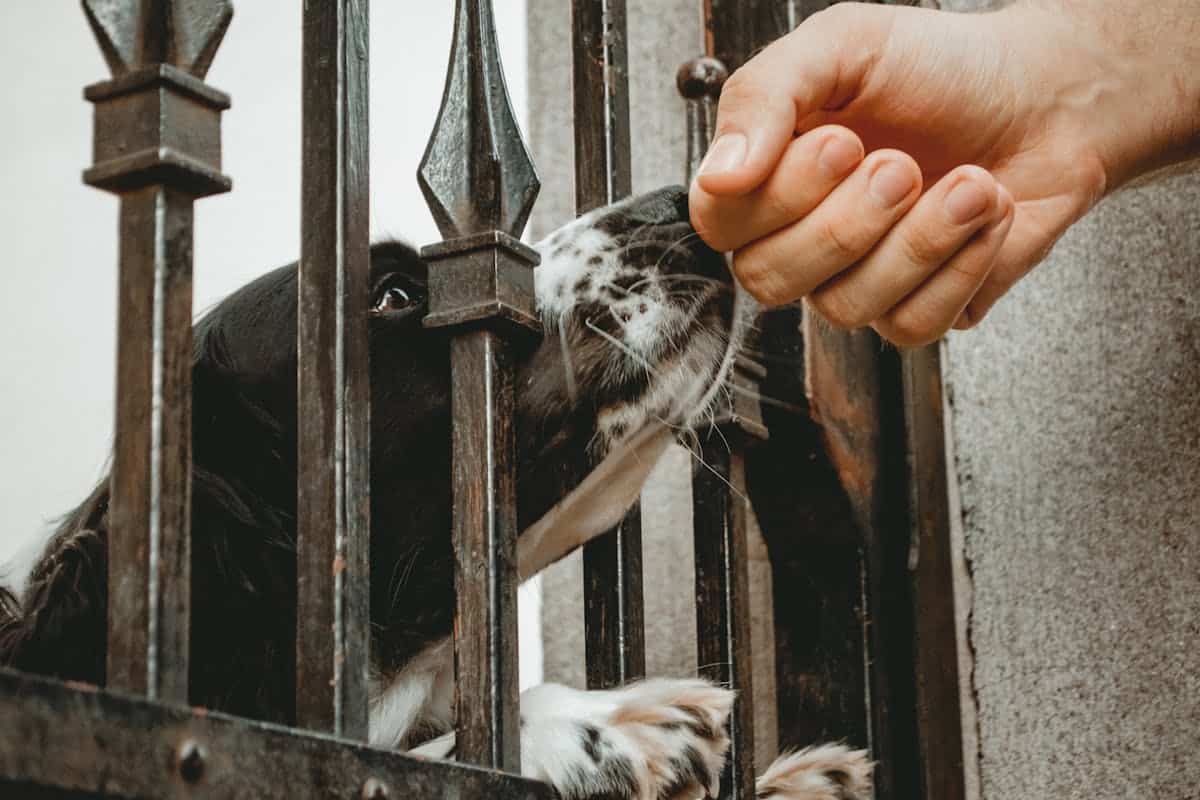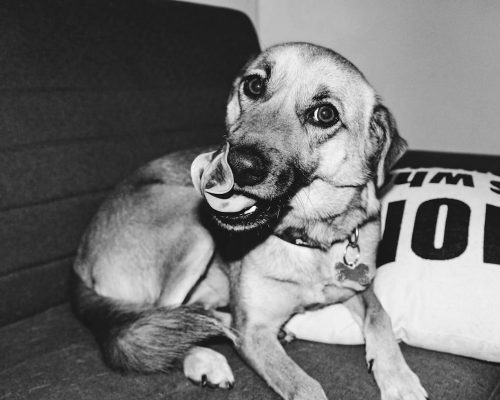If you’ve noticed your dog keeps sniffing you and crying, you’re not alone. It’s a puzzling behavior that often leaves pet owners concerned and searching for answers.
Is your furry friend trying to tell you something? Could it be a sign of illness, anxiety, or something completely unexpected?
The good news is that your dog’s actions usually have a logical explanation, and understanding them can strengthen the bond between you and your canine companion.
In this comprehensive guide, we’ll explore the potential reasons your dog keeps sniffing you and crying, break down the emotions behind the behavior, and offer practical solutions to help you address it. By the end, you’ll have a clearer understanding of your dog’s behavior and what steps to take next.
Table of Contents
ToggleWhy Dogs Sniff: Understanding Their Extraordinary Sense of Smell
Dogs experience the world primarily through their noses. While humans rely on sight, dogs process information about their environment—and their owners—through scent. Their olfactory abilities are nothing short of remarkable.
- A dog’s sense of smell is 10,000 to 100,000 times more sensitive than a human’s.
- Dogs can detect subtle chemical changes in the body, including hormonal shifts, stress, and illness.
- They use sniffing to gather information about people, animals, and objects around them.
When your dog sniffs you, they’re essentially “reading” you—understanding where you’ve been, how you’re feeling, and what might have changed. If crying accompanies the sniffing, it could indicate urgency, discomfort, or strong emotions.
Common Reasons Your Dog Keeps Sniffing You and Crying
1. Emotional Connection: Seeking Reassurance
Dogs are highly attuned to their owners’ emotions. When you’re sad, stressed, or overwhelmed, your dog may sense these changes and respond by sniffing you and crying.
- Sniffing your scent releases calming chemicals in their brain, helping them feel closer to you.
- The crying could be their way of expressing empathy or asking for comfort.
Example: If you’ve had a tough day, your dog may whine and sniff you persistently as if to say, “I’m here for you.”
2. Detecting Illness or Changes in Your Body
One of the most fascinating abilities dogs possess is detecting illness. Their noses can identify subtle chemical changes caused by certain medical conditions.
- Dogs have been known to detect illnesses like cancer, infections, and diabetes.
- If your dog is fixated on a specific part of your body, it might be picking up on something unusual.
What to Do: If this behavior persists, especially if accompanied by unusual focus on one area, consider consulting a doctor for peace of mind.
3. You Smell Different: Hormonal Changes or New Scents
Your scent can change due to various factors, including hormonal shifts, stress, or external smells.
- Pregnancy, menstruation, or hormonal imbalances can cause your body to emit different odors.
- Wearing a new perfume, using a different lotion, or even sweating after exercise can make your scent unfamiliar.
Your dog may sniff you excessively to investigate the change, and crying could be their way of expressing confusion or curiosity.
4. Separation Anxiety: Fear of Being Left Alone
Dogs that suffer from separation anxiety often display clingy and vocal behaviors.
- If your dog sniffs and cries when you’re about to leave the house, it’s likely experiencing distress about your absence.
- Dogs rely on your scent for comfort, so sniffing may be a coping mechanism.
Tip: Gradually desensitize your dog to your departures by creating positive associations, like giving treats or toys before you leave.
5. Attention-Seeking Behavior
Your dog may simply want your attention. If sniffing and crying have worked before—earning them a pat, treat, or cuddle—they’re likely to repeat the behavior.
- Dogs quickly learn which actions elicit responses from their owners.
- This behavior often escalates if their emotional or physical needs are not being met.
Solution: Ensure your dog gets adequate exercise, playtime, and mental stimulation each day.
6. Stress or Anxiety in Your Dog
Changes in routine, loud noises, or new environments can cause stress for dogs. In such situations, they may turn to you for comfort by sniffing and crying.
- Dogs mirror their owners’ emotions. If you’re anxious, your dog may also feel unsettled.
- Sniffing is soothing for dogs, while crying may reflect their unease.
How to Help: Use calming techniques, like gentle petting, soft music, or a safe space where your dog feels secure.
7. You’ve Been Around Other Animals
If you’ve recently interacted with another dog, cat, or even wildlife, your dog may sniff you more intently and cry.
- Dogs are territorial and sensitive to unfamiliar scents.
- The crying may signal jealousy, curiosity, or a desire to investigate further.
Quick Fix: Reassure your dog with affection and spend quality time together to ease any feelings of jealousy.
8. Hunger or Thirst: Basic Needs
Sometimes, dogs cry and sniff as a way to communicate that their basic needs—like food or water—are unmet.
- Dogs rely on routine. If a mealtime is delayed, they may become vocal and clingy.
- Sniffing you might be their way of drawing attention to their needs.
Action Step: Stick to a consistent feeding schedule and ensure fresh water is always available.
9. Medical Issues in Your Dog
If your dog is crying persistently, it could be dealing with its own discomfort or pain.
- Conditions like arthritis, dental disease, or urinary tract infections can cause dogs to act differently.
- Excessive crying combined with unusual behavior may warrant a visit to the vet.
When to Seek Help: If your dog seems lethargic, refuses food, or displays signs of pain, consult a veterinarian immediately.
10. Excitement Overload: Expressing Joy
Dogs may cry and sniff you when they’re overwhelmingly happy.
- This often happens when you return home after being away.
- Their sniffing is part of reconnecting, while crying expresses excitement and relief.
Example: Your dog may bounce around, wag its tail, and whine joyfully while sniffing you head to toe.
How to Address Your Dog’s Behavior
If your dog keeps sniffing you and crying, here are some effective strategies to address it:
- Check for Health Issues: Rule out any medical concerns by consulting a vet.
- Meet Their Needs: Ensure your dog’s basic needs—food, water, and exercise—are consistently met.
- Provide Mental Stimulation: Use puzzle toys, training sessions, or scent games to engage their minds.
- Strengthen the Bond: Spend quality time cuddling, playing, or simply relaxing with your dog.
- Reduce Anxiety: Create a safe, calming environment and establish a consistent routine.
Conclusion
When your dog keeps sniffing you and crying, it’s their way of communicating. Whether it’s detecting a health issue, seeking comfort, or expressing excitement, this behavior often has a deeper meaning.
By observing your dog’s cues, understanding the reasons behind the behavior, and taking appropriate action, you can ensure both you and your furry companion remain happy and healthy.
Ultimately, a little patience, attention, and care go a long way. Your dog’s loyalty and love are unwavering—sometimes, they just need you to listen to what they’re trying to say.






